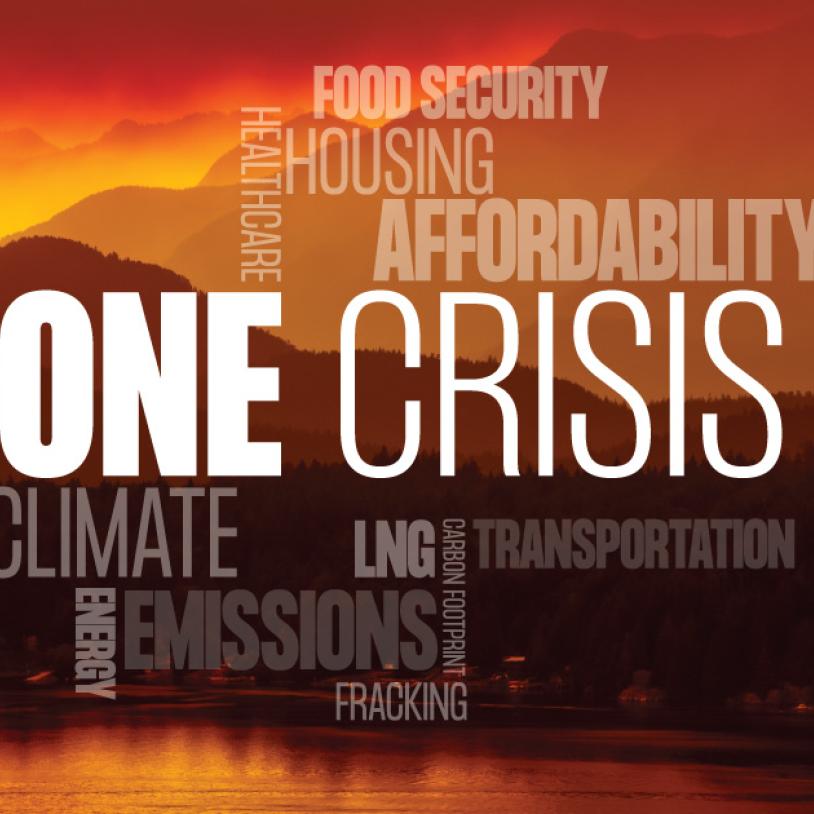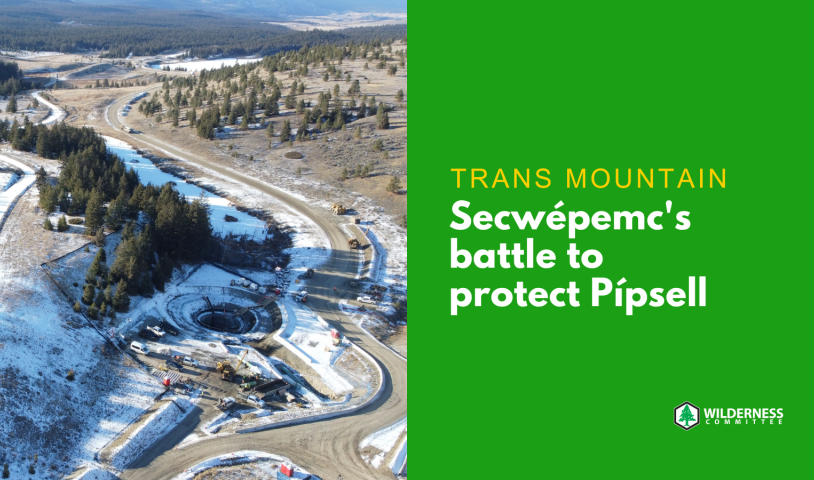Biggest ever ‘Paddle for the Peace’ in northeastern B.C.
Tuesday, July 12, 2016
Protesters still hope to halt construction of Site C Dam
"I sure as hell don't want to see this dam go up, it's already destroyed a lot," said Della Owens, an elder from Saulteau First Nation. Owens and her family joined about one thousand people and hundreds of watercraft participating in the 11th annual Paddle for the Peace on July 9 outside of Fort St. John, B.C., west of the Site C Dam construction site.
Hydro has already removed eagle nests. They said they would relocate them. How do you relocate them? Tell the eagles you're going to live here now?"
The fight gets real
First Nations leaders, politicians, residents, and activists put forth a long list of things wrong about the mega-project that already has the green light and which B.C. Premier Christy Clark intends to get to the point of no return.
"This year, the fight gets real,” Joe Foy of the Wilderness Committee, a return participant in the annual Paddle, told Ricochet. "Our government is doing real nasty harm to us."
Several protesters held out for 62 days in the dead of winter occupying a historic site and blocking the clear cutting that was scheduled. "They stood up to incredible corporate aggression at great cost," said Grand Chief Stewart Phillip of the Union of B.C. Indian Chiefs. They are now facing lawsuits totalling millions of dollars. The First Nations can't understand why they are being forced to face the destruction of their territories again. "What the hell do we need a third dam for?" asked Jim Davis, a member of the Saulteau Nation. The Williston Reservoir created by the WAC Bennett Dam built in the 1960s flooded 350,000 acres of First Nations territory. The Peace Canyon Dam created a 21 kilometre long reservoir that flooded lowlands. The Site C Dam would create an 83 kilometre long reservoir flooding forests, riparian land, and highly productive farmland.
First Nations still trying to stop the project
Although there are several species of fish in the Peace River, Davis said he's been told that it is not safe to eat more than one fish every two months. That's because the fish have high levels of mercury from the toxins released by the decaying vegetation that resulted from the creation of the massive Williston reservoir. "They tell me I can get meat from the store and live on a reserve. Are you kidding?!"
Davis is also concerned that the Site C Dam would raise the level of Moberly Lake that is part of the river system. "It'll be a dead lake. It would be brutal if it goes ahead."
Kim Parsey, from West Moberly Nation and Davis's wife, said the recent forest fires and the flooding in the Peace Region should be sending a signal. "It's kind of like God telling you 'You can't do this.'"
"There's no reason to destroy this river to produce energy."
The First Nations in the Peace Valley have spent $2.3 million so far on legal fees to have the B.C. government respect their treaty rights and stop the project, Parsey said. They're off to federal court in Montreal in September for the next round.
"There's no reason to destroy this river to produce energy," West Moberly Chief Roland Willson told Ricochet. Other alternatives like geothermal have not been considered, he said.
Owens wrote her master’s thesis on the effects and losses of the WAC Bennett Dam construction. Recently, she worked on a project recording Indigenous peoples' accounts of the impact of the dam. "Four First Nations were deeply affected and uprooted and they were never compensated. BC Hydro won't tell you anything."
The Site C Dam will destroy several trap lines and many small mammals, she added. She recently taught a group of people about edible and medicinal plants in the area. These too will be under several metres of water, she said. "Christy Clark is destroying our land."
“There are a lot of things BC Hydro doesn't tell people."
Owens pointed to several places on the nearby hills. "There are burial grounds there and there and there. If the people can't stop the project, those places will be underwater. If I went to Christy Clark's house and destroyed her things, I would be put in jail!
"I understand people have to put food on the table and pay bills. For the people in Fort St. John, their hands are tied. The economy is the lowest it's been. BC Hydro has the upper hand because people need work. There are a lot of things BC Hydro doesn't tell people."
Davis said he's heard the argument that people need jobs. "They need work, but they need the land too. Work's not going to last long, but the land will be there forever."
People of all ages from communities all over the province and some from across the country came to the Paddle for the Peace. Over 50 people from Vancouver Island dubbed their rented bus the Rolling Justice Bus. Similar events were held in several B.C. communities as well over the weekend.The West Moberly and Prophet River First Nations provided a free breakfast and lunch to all participants.
"This river means everything to us," Lynette Tsakoza, chief of Prophet River, said in her welcoming remarks to the participants. Darcy Chipesia, also from that nation, said, "This is just a money thing. It's not going to benefit us in any way. We have already been impacted by the Bennett Dam. The wildlife is in trouble. The caribou are gone and the moose are down."
The Keepers of the Water, representing First Nations from the North West Territories to Arizona came to the protest and held a big meeting the following day. "Yes. This is our homeland, but we all have an interest in saving this planet," said Sam Gargan.
Several speakers called out the provincial government for trying to pit Indigenous people against non-Indigenous. "This project does not benefit anybody except a select few," said Craig Benjamin from Amnesty International.
George Heyman, NDP environment critic, said the dam project is "wrong on every count" because of its negative impact on agriculture, the environment, First Nations, clean energy commitments, economics, and the promise of jobs.
Agronomist Wendy Holm said that 67 per cent of B.C.'s produce is imported and called the Peace Region "our food commons." The region could be an important food source for people in the North. "This is the greatest transgression of public polity that I've ever seen," she said.
Keeping promises to Indigenous peoples means no Site C
Karen Bakker & Rita Wong from SiteCStatement.org, came with the message that the 350 academics who have signed on want to "do what we can to provide robust independent research" to counter proponents' claims that the dam will be clean and sustainable.
Ross Peck, from the Peace Region Environmental Association representing landowners, said, "the battle has taken its toll...but it's a good fight. The river has fed us, watered us, entertained us, and educated us." He quoted Richard Bullock, former chair of the Agricultural Land Commission, who said, "It's a crime against humanity to flood this valley."
MP Sheila Malcolmson and Elizabeth May, leader of the Green Party, pledged to hold Prime Minister Justin Trudeau to his promise to respect First Nations and hold nation-to-nation dialogues which must include respect for treaties and not signing permits that are necessary for the Site C project to go ahead.
"We must keep the Peace and we must keep the promises," said May "Keeping the promises means no to Site C."
"Mega projects have the greatest impact on women and marginalized people," said Malcolmson. "We need a renewable, sustainable, and just future."
Local residents have asked UNESCO to come to the region to do a two-week fact-finding mission this fall. The Peace Athabasca Delta is a world heritage site and people are optimistic that the value of the Peace River will also be recognized.
Grand Chief Stewart Phillip and Joan, his wife, joined the flotilla of canoes and kayaks. "We all live here. We all have a responsibility to save this river," Joan said. "We don't need another damn dam!"
"We can't allow the destruction of homes and the eviction of people from this land they've held for many generations."
Stewart said he's seeing a paradigm shift going on around the world where people everywhere are rejecting the colonial and neocolonial thinking that leads to the destruction of Mother Earth.
"We have 15 grandchildren. The work we do not do, the challenges we do not rise to, we leave to them. We must do our utmost to stop this ludicrous project."
He called on people to show up, speak up, and commit to contacting the prime minister continuously. "We can't allow the destruction of homes and the eviction of people from this land they've held for many generations."
Owens was beaming as her two daughters reached the landing area with their canoe. "This is about saving our land. I don't get paid in money, but in here," she said, pointing to her heart. "I'm poor, but in my heart, I'm filthy rich!"
Photo: Chief Roland Willson of the West Moberly First Nation




